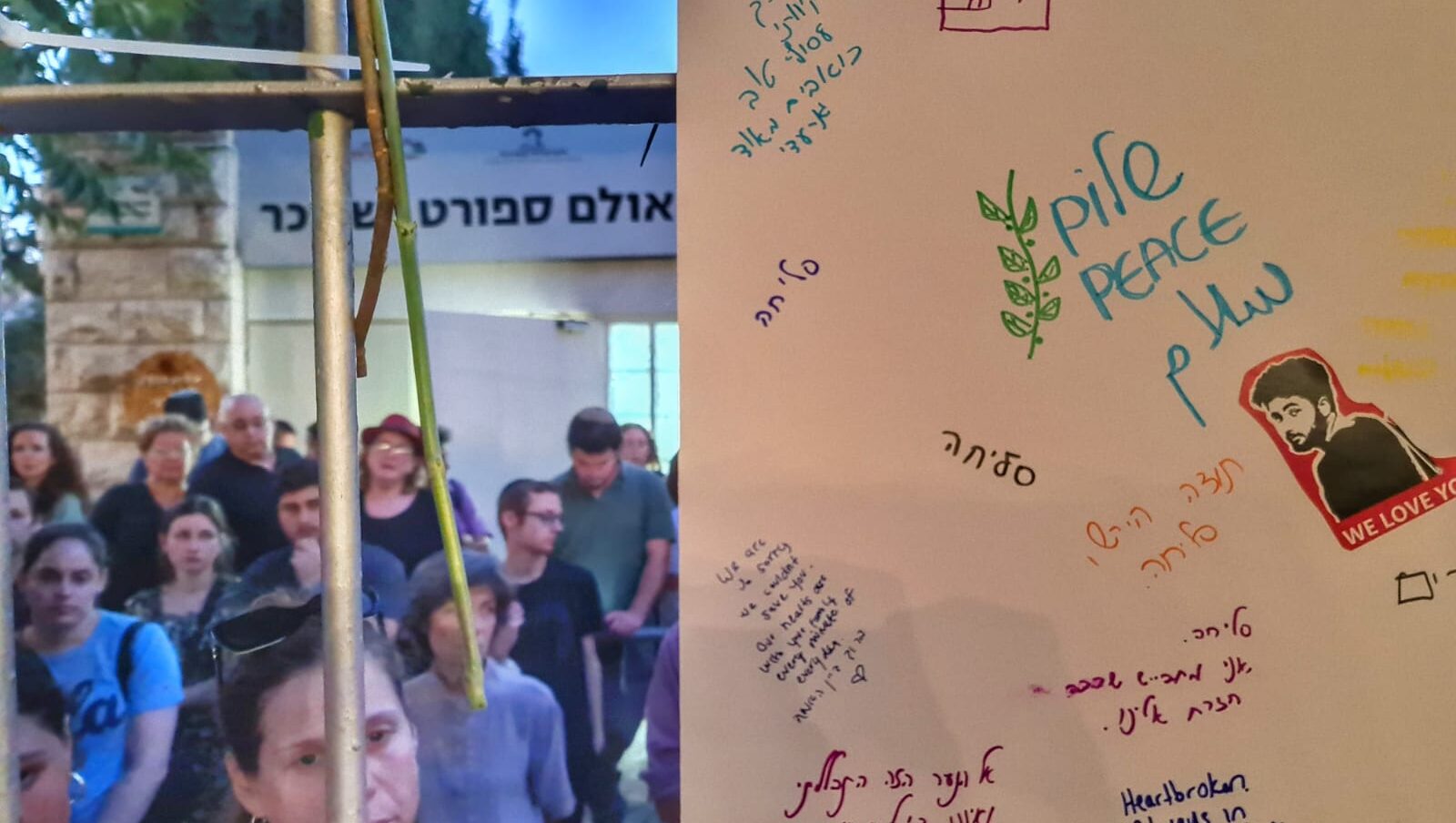When I walked into the small, ramshackle gymnasium that is our humble synagogue on Shabbat morning this past week, pictures of the 14 children from the congregation who would be starting first grade on Monday decorated the walls. It must have been one of their parents who thought to surround the photos with quotes from my favorite Mishnah, Avot 4:1.
One drawing of “Who is wise? The one who learns from everyone.”
One drawing of “Who is mighty? The one who subdues their evil inclination.”
One drawing of “Who is rich? The one who rejoices in what they have.”
One drawing of “Who is honored? The one who honors their fellow human beings.”
These are beautiful blessings for children, for all of us, including our decision-makers. It was uplifting to see.
The decorations show that what is really special about our synagogue in a corner of southeast Jerusalem is what happens when the community gathers. Every attempt to decorate the space for a bar or bat mitzvah or any other occasion is an exercise in creativity and connection.
During my year of mourning since our son Hersh was killed in captivity in Gaza, I accepted the custom to not lead prayer services as the shaliach tzibbur on Shabbat or holidays. I’m not a particularly good shaliach tzibbur anyway, but I am generally willing. When Aharon the gabbai (who organizes the services) approached me as I was absorbing the photos and teachings on the wall and asked me if I would lead the opening part of the service, the Psukei D’zimra, I was thrown momentarily. I hadn’t performed any formal task at my synagogue since the cursed morning of Oct. 7, 2023, when I was in the role that Aharon is in today, gabbai. Was I now ready to take this step out of formal mourning? “OK,” I said, and I got up and started. “Rabbi Yishmael says on 13 principles the Torah is interpreted…”
The photos of these children about to begin their educational journeys, the teachings on the wall, and my small personal step in the transition out of the community of mourners (is there ever really a way out from this group?) and back into the broader community led me to see my morning in synagogue in a sharpened light. Perhaps those few hours in my wonderful synagogue was a microcosm of the realities, the emotional complexities, of our world today.
As every week for far too many weeks, when Torah reading began, cards with the name, photo and brief biography of each hostage were circulated. It’s so important that we know the hostages as real people, individuals with dreams and families and passions. This week, I got Eitan Horn’s card. I already knew that Eitan was visiting his brother Iair on Kibbutz Nir Oz and that he’s a Hapoel Beer Sheva fan and an informal educator who served as an emissary in Peru and is a beloved uncle and brother and son, but all the hostages’ personal stories must be continuously read and reinforced.
The Torah portion, Parashat Shoftim, contains so many lessons on national ethics and moral governance, perhaps most famously, the phrase “Tzedek Tzedek Tirdof” (justice, justice shall you pursue). Of the thousands of explanations to explain the repetitive “Tzedek Tzedek,” the one I find most compelling and relevant for us today is that one Tzedek implores us to have just goals and one Tzedek is there to ensure that the path to achieve those just goals must also be rooted in justice.
Later in the Torah reading, friends of ours, a couple much younger than us, came up to the bimah to name their newborn daughter, a baby born into this complicated reality that must get better — a baby whose father, a doctor, performed hundreds of days of reserve duty in this ongoing war. How fitting, therefore, that they named her Roni Tzion. Roni means “sing” or “rejoice,” but it’s in the feminine command form, as if to instruct this innocent baby that she must find it in her to rejoice. Tzion is a biblical reference (first appearing in Samuel 2) to Jerusalem and subsequently used in Jewish liturgy and poetry to convey our national longing (Zionism). It’s as if, as a community, we are manifesting our national longing for something better, a reason to rejoice, in this adorable baby.
Between the sixth and seventh aliyot of Torah reading, for the 97th straight week, our community stood together to recite a prayer for the safe return of our beloved hostages, followed by the soulful song that has become the anthem for the hostages. “Our brothers and sisters, the whole house of Israel, who are given over to trouble or captivity, whether they abide on the sea or on the dry land: May the All-present have mercy upon them, and bring them forth from trouble to relief, from darkness to light, and from subjugation to redemption, now speedily and at a near time. Now let us say, Amen.”
We moved on to the Haftarah. A young man began the blessings in a beautiful but uncommon tune, the traditional Italian (but not Roman, as Rome has its own melody) version. I couldn’t help but to look around the room and notice, in addition to the native Israeli Sabra majority, immigrants hailing from Australia, Belgium, Canada, France, Ireland, Italy, Russia, Switzerland, the United Kingdom, the United States and elsewhere. Kibbutz Galuyot (the ingathering of the exiles) is alive and thriving — Jews from all over the world in one synagogue, united to strengthen Israel and giving all we have to make it better.
As the prayers concluded, the 14 children starting first grade were seated in front of the room. In a uniquely Israeli ceremony, the grownups serenaded these children with songs about the beauty of the Aleph-Bet and the treasure trove that is education. The children ate cookies in the shape of Hebrew letters, dipped in honey. How sweet is education, Jewish education in the land of Israel. How promising is the potential of what these children will be empowered to do with this treasure trove. And how Israeli, that in their “What I wish for” notes, so many of these kids wrote, “That all our hostages will come home soon.”
With 48 hostages still held in captivity in Gaza, our Shabbat morning work would be incomplete without the 3-minute walk to a main intersection, the Oranim Junction, to join the weekly Shabbat-observant (no microphones, no cameras) vigil for the hostages. Hundreds of people from southeast Jerusalem’s diverse community — men with kippot, men with uncovered heads, women in skirts, women in pants, elderly in wheelchairs, babies in strollers — joined together beseeching the Creator of the Universe, yet again, to hasten the return of our loved ones.
As I headed to Shabbat lunch, I found myself digesting the intersection of the personal and the communal, the balance between finding joy and not slowing down on the critical work to save our hostages. I find myself hoping that the small step I took in leading Psukei D’zimra may lead to another small step for me, for my family, for our country, for Am Yisrael. Most of all, I think of our young people and of baby Roni Tzion, and I pray that soon we all find a reason, and a way, to manifest a level of sweetness and joy as we embrace the return of our 48.
JTA has documented Jewish history in real-time for over a century. Keep our journalism strong by joining us in supporting independent, award-winning reporting.







